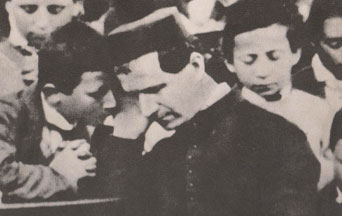
Have you ever wondered about the difference between Catholic charity and modern philanthropy? Both care for the poor’s material needs. However, true Catholic charity adds two very important elements—supernatural vision and aid.
Indeed, infinitely more can be done with the aid of God, Our Lady, the angels and saints. The saints saw this and applied this supernatural aspect concretely to the broken society in which they lived.
Prof. Mary Walsh masterfully maps out Catholic charity’s supernatural and physical advantages over naturalistic philanthropy in her book titled The Saints and Social Work (Silver Spring, Maryland: The Preservation of the Faith, 1936). Prof. Walsh (1905-1987) wrote, bearing in mind the socially destructive effects of the Industrial Revolution. Though written in the thirties, her book still has incredible relevance today.
Eternal and Natural Law: The Foundation of Morals and Law
Prof. Walsh earned her doctorate in Sociology at the Catholic University of America (CUA) in 1937. She then became an assistant professor, associate, and ordinary professor at the same university until retiring in 1971.
She uses the lives of 25 modern saints and blesseds to illustrate her point. These included Saint John Vianney, Saint John Bosco, Saint Therese of Lisieux, Saint Gabriel Possenti, Saint Bernadette Soubirous, Saint Catherine Labouré and Saint Gemma Galgani.
These saints had a special reverence for the poor. Their relationship was that of one member of the Mystical Body of Christ to another. Thus, they saw a reflection of Christ in each person. They loved the poor.
For this reason, many of these saints practiced voluntary poverty. True love is selfless toward those who are loved. The saint practice this poverty as the best way of winning the poor over to Christ. As Saint John Bosco said, it was the most effective way of gaining God’s favor and blessing on their work. The saints regarded God’s favor as being the most necessary part of their apostolate with the poor.
These saints were concerned not only with the poor’s physical health and security but especially their spiritual good. This concern was their main motivation. They thirsted for poor souls whose life was full of suffering. They taught them how to deal with suffering and how to find the rest they desired in God.
 Learn All About the Prophecies of Our Lady of Good Success About Our Times
Learn All About the Prophecies of Our Lady of Good Success About Our Times
Their work was imbued with the “spirit of self-sacrifice.” An example from Saint Anthony Mary Claret illustrates this well. He gave most, and sometimes all of his food to the needy. Thus, he often said, “God helps him who practices voluntary poverty in two ways: either by moving the heart of the rich to help him or by enabling him to live without eating. I have experienced both of these things.”
Unfortunately, many modern social workers do not have this relationship with the poor they serve. Their relation is that of a health care provider to a patient in need. As a consequence, their work focuses more on the physical needs rather than the entire person as body and soul.
The saints had another distinct characteristic, which sets them apart from philanthropists. They practiced prayer and confidence when seeking God’s aid. They communicated the importance of prayer and religion to the poor. Prof. Walsh says that “It is indeed true that the twenty-five unanimously regarded religious instruction as their most important service to the poor.”
Science Confirms: Angels Took the House of Our Lady of Nazareth to Loreto
The Saints and Social Work proves the advantages of Catholic charity, as exemplified by the 25 saints. Prof. Walsh is extremely logical about all her assertions and documents them well.
Her excellent book demonstrates that the Catholic Church gives enormous strength to society through this social work. For anyone interested in defending the Catholic sense of charity, read this work.
In this secular era, when people want to be independent of God and His Laws, it is good to recall that the most perfect form of aid to the needy is salvation. If this is sought, all the rest follows. Prof. Walsh’s book The Saints and Social Work sets the record straight.

